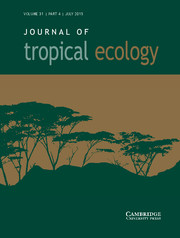Article contents
Seed germination and early seedling establishment of some elephant-dispersed species in Banyang-Mbo Wildlife Sanctuary, south-western Cameroon
Published online by Cambridge University Press: 28 April 2003
Abstract
Effects of the elephant gut and elephant dung on seed germination and early seedling establishment/growth were investigated in Banyang-Mbo Wildlife Sanctuary using undestroyed seeds of 14 plant species sorted from fresh elephant dung between 1 June 1994 and 31 May 1995 and similar seeds extracted from fresh ripe fruits fallen on the forest floor within the same period both sown in fresh elephant dung and forest soil. Parameters measured were final germination success, germination time and seedling growth rate. Results indicated that two species, Panda oleosa and Poga oleosa, did not germinate at all after 365 d irrespective of their sources and media of planting. Germination success observed in ingested seeds was significantly different from that observed in seeds from fresh fruits. Germination success observed in elephant dung was not significantly different from that in forest soil. Mean germination time varied widely between species and treatments but was generally shorter in seeds that passed through the elephant gut than those collected from fresh ripe fruits and these differences in mean germination time were significant in 92% of the species that germinated. Growth rates of seedlings from ingested seeds were higher than those from fresh ripe fruits especially in elephant dung. Growth medium was highly significant to growth in 10 of 12 species (83%) and source was important only to two species (16%) while their combined interacting effects were significant to three of the 12 species (25%). It is concluded that ingestion of seeds by the elephant is important in the germination of some rain-forest species and the elephant dung that contains the seeds dispersed is very important in the rapid growth of the seedlings. On the basis of germination success plant species that are absolutely or exclusively dependent on elephants for dispersal/germination are absent in Banyang-Mbo Wildlife Sanctuary, while Omphalocarpum elatum and Strychnos aculeata would be on the basis of fruit morphology.
- Type
- Research Article
- Information
- Copyright
- © 2003 Cambridge University Press
- 45
- Cited by


